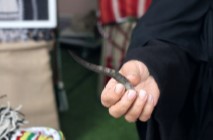HANDS AT WORK
Tent Weaving
Woven panel of a Bedouin bayt mushatta (winter tent); wool and goat hair (detail).
Souq Al Qattara, Al Ain, Abu Dhabi. Photograph by Omar Al-Yammahi, 2015
In the poetic tradition of a tent-dwelling society, you would expect to hear a lot about domestic weaving. Modern ethnography tells us that several times a year, the women of the Bedouin household must weave a new tent panel, called a flīj, to replace one that's wearing out, and that a single flīj takes about three days. And yet descriptions of tent-weaving are vanishingly hard to find in the first three centuries of Arabic poetry.
Partly it's a matter of selection. The poetry that survives from the 6th to 8th centuries CE was recorded by latter-day scholars of Iraq, so our purview is limited to verse that didn’t clash with their ideals of taste and ideology—nor the ideals of the ruwāt, who were the generations of oral transmitters between the scholars and the early poets. If the invisibility of Bedouin women's labor (not just textile craft but cooking, childcare, and their other duties) wasn't imposed in these later periods, then it owes to the early period itself.
Skill in tent-weaving was nothing for male poets to boast about. Consider the line by al-Samaw’al of the mid-6th century (meter: wāfir):
Formidable is the house I raise, not of clay
or wood, and formidable the glory I bring forth.
In the poet's disdain for permanent constructions, his pride in tent-dwelling is implicit. Bayt, the word for "house," really means "tent" (as well as "verse," which complicates things a little—or a lot, actually. At a glance, there is no way to tell if بيت الشعر means "verse of poetry" or "tent of goat hair"). In any case, al-Samaw’al claims no responsibility for the tent's manufacture, nor for setting it up and taking it down, all of which is women's work.
In classical parlance, the flīj is called falīja, as in a stray verse by the Umayyad-era poet ‘Umar ibn Laja’ (meter: wāfir):
He went clothed in nothing but
the worn out scrap of a falīja.
And for every other component of the Bedouin tent, more loci could be cited. But if you find a mention of tent-weaving as technique or process in early Arabic poetry, then what you've found is precious and rare. Other textile crafts are mentioned with regularity—matweaving, for one—but with regard to domestic Bedouin weaving there seems almost to be a conspiracy of silence. This leads me to issue not a challenge but a plea. If you know of a reference to tent-weaving in the first three centuries of Arabic poetry, please let me know, either at my faculty email or writing dot gathering dot field at gmail dot com, and you'll be thanked by name in Hands at Work.
As a show of good faith, here is one reference I can show, in a pair of verses by the pre-Islamic warlord Durayd ibn al-Summa (meter: ṭawīl):
"The cavalry have felled a knight!” they cried to each other.
At this, I told ‘Abd Allah: “They’re the ones who are going down.”
He called back to me that morning, as spears went for him
the way a stretched weaving is struck by ṣayāṣī.
A ṣīṣa, pl. ṣayāṣī, is a weaving tool, and literally it is a "horn," and when you see one in the hand of a present-day Bedouin weaver you'll understand why:


Gazelle horn used in al-Sadu weaving, Kuwait. Photographs by
Rana Al-Ogayyel, 2019
The meaning of the verses is that ‘Abd Allah came unhurt through the fight. The enemy's spears went at him without touching him, just as ṣayāṣī pass between warp threads and cause no harm. I believe the simile affords a glimpse of domestic weaving in the pre-Islamic period, and the fact that the fabric is horizontally "outstretched" (mumaddad) only strengthens my conviction. Because the Bedouin weave on ground looms, and not upright ones.
And that's how far you have to go for a peek at pre-Islamic Bedouin weaving. If you wonder why this matters, I guess I don't blame you, unless you've been researching textiles in Arabic poetry as obsessively as I have. And even then the stakes might not be well apparent. The silence surrounding domestic weaving in poetry of the pre- and early Islamic periods has been remarked on by no one that I know of. One thing that makes it hard to recognize is the nostalgic esteem in which it's held today, the institutional protection it receives (from Kuwait's Al Sadu Society, the House of Artisans in Abu Dhabi, the Sharjah Institute for Heritage, etc.), and its recognition by UNESCO, all of which make it seem that Bedouin weaving has been neglected only in recent times. The true history of the matter is unknown to me, but I do know it's more complicated than that.

I take seriously David Hume's age-old caution that causality and the answers to "why" questions aren't subject to logical proof. So when it comes to explaining why something is not, how much more caution is needed? But the mind is restless, and fumbles for answers, and in the book I'm writing I'll share mine. It's not the only silence in poetry to be made sense of.









